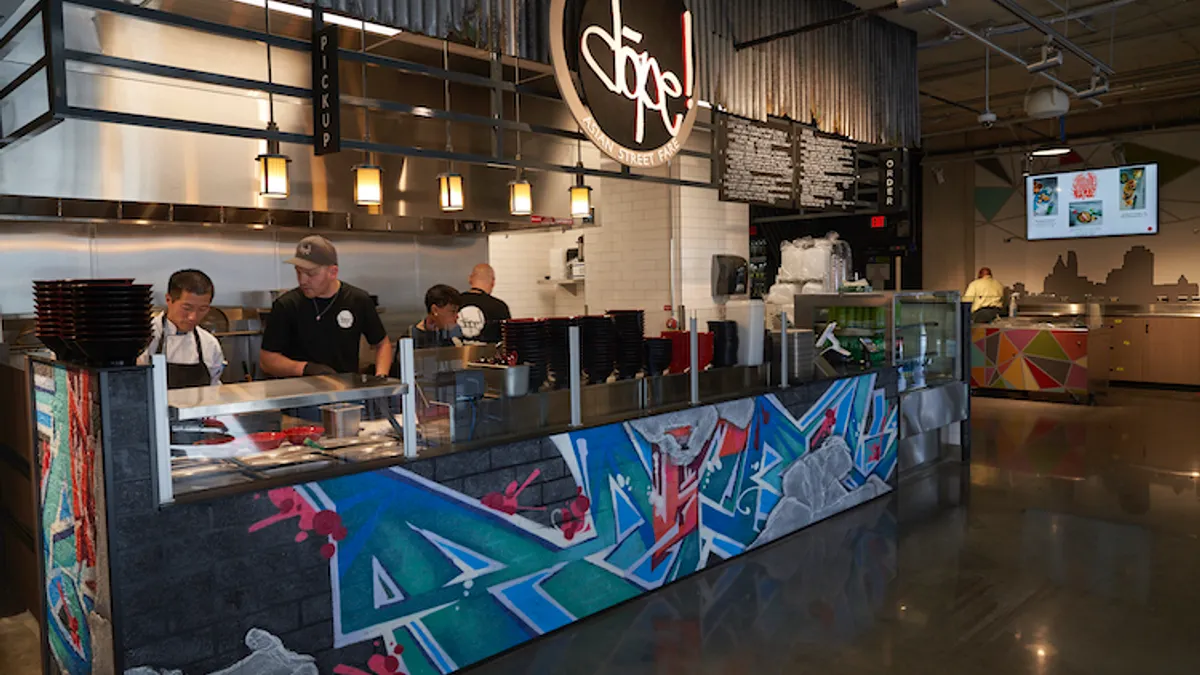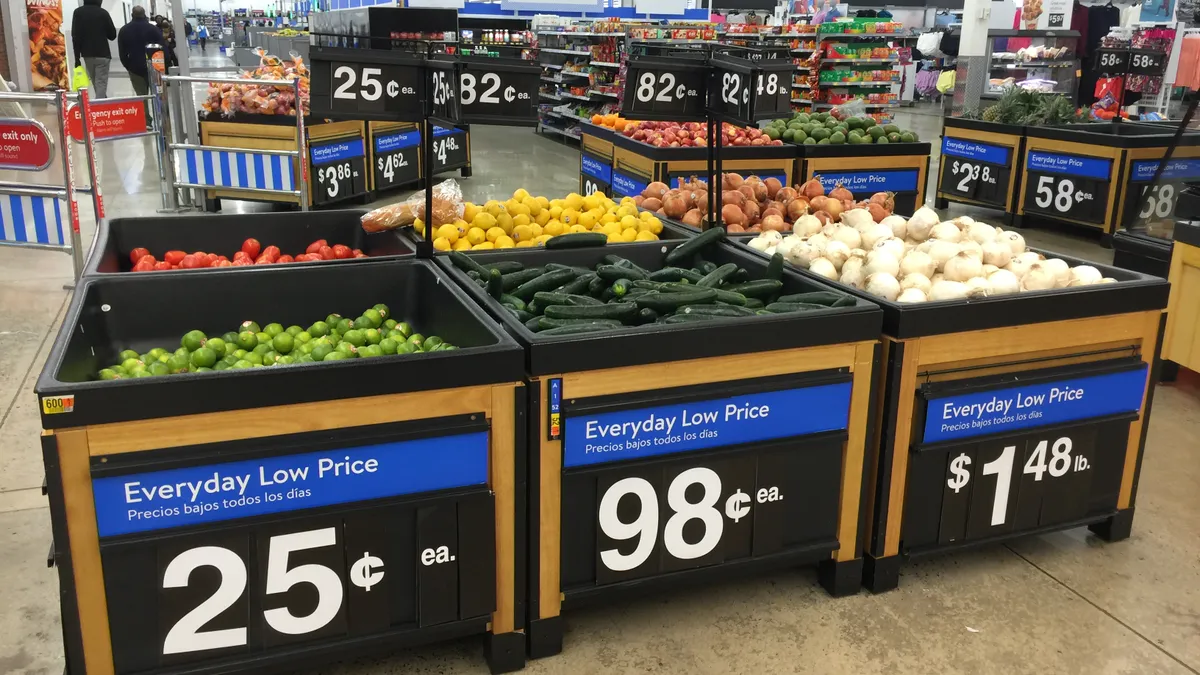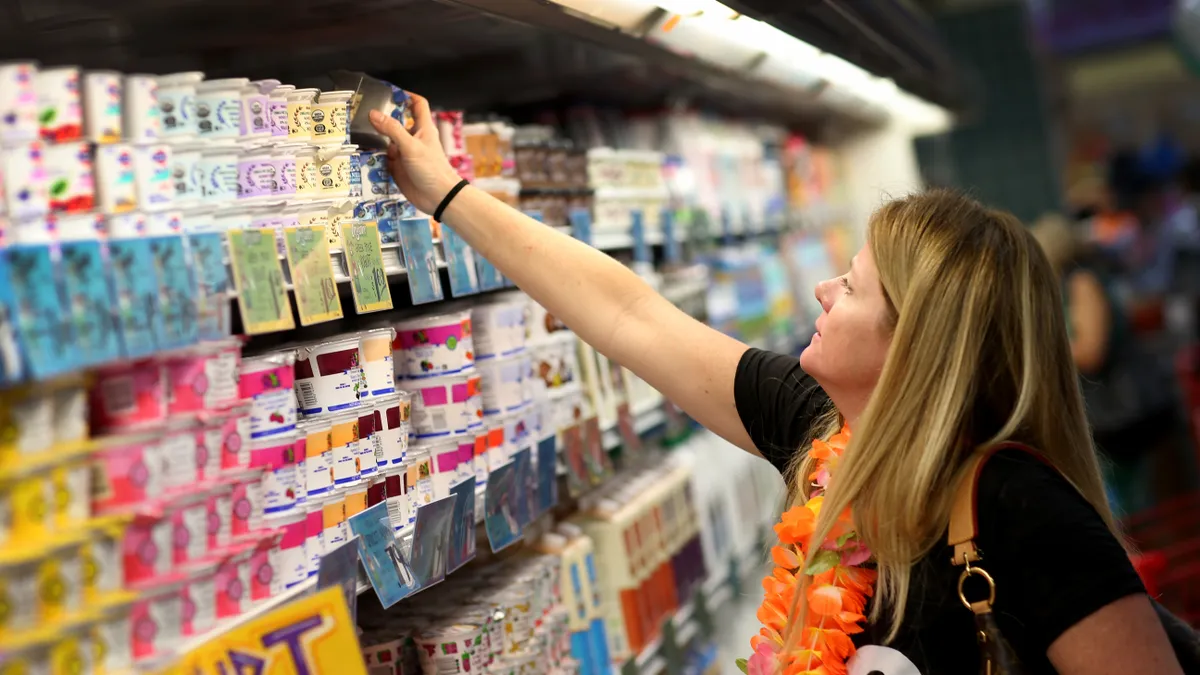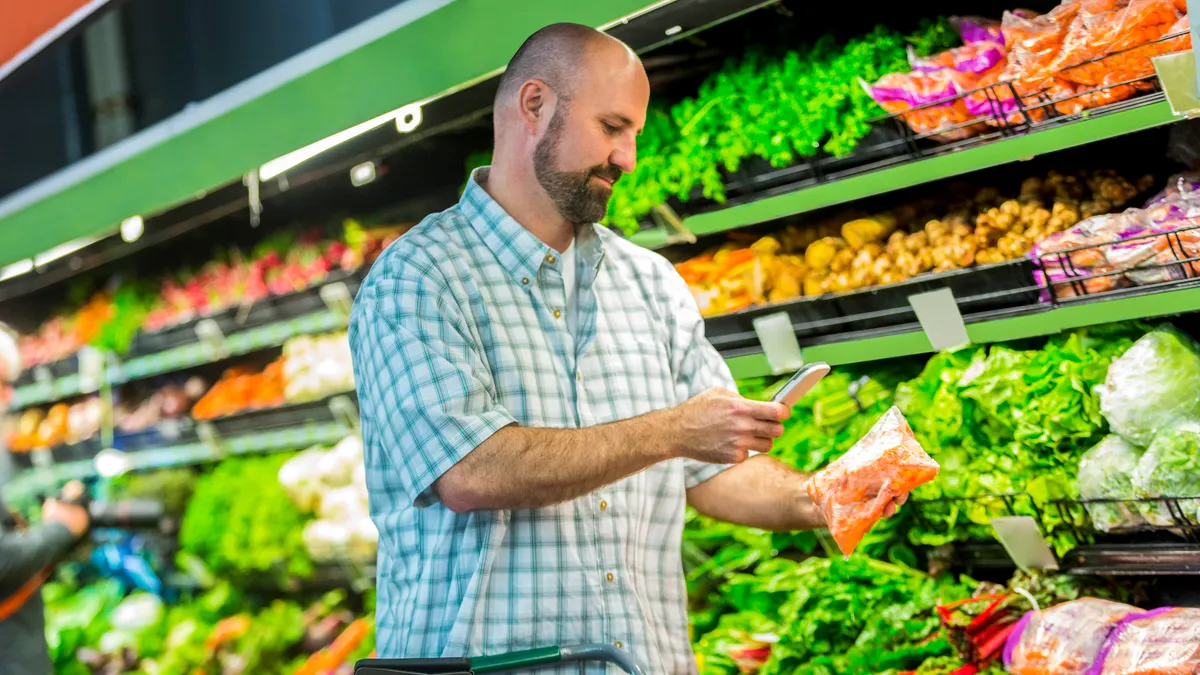This story is part of a series of pieces looking at trends in the industry. Read more about the 4 grocery markets to watch in 2020.
Grocers have had to test and invest at a faster pace than they'd like since Amazon acquired Whole Foods nearly three years ago. But they're starting to get their footing, and the result is a much better shopping experience for consumers. This year, look for retailers to build out a few of the most promising services and technologies that will help them compete in the next decade of food retailing.
Premium and specialty private-label rollouts will accelerate
From Target’s Good & Gather to ShopRite’s new food and household brands, 2019 saw retailers push private label into new premium categories. Tory Gundelach, senior vice president at Kantar Consulting, told Grocery Dive she expects retailers to continue expanding their gourmet and specialty selections in 2020.
"I think we should expect to see in 2020 the next step to that, whether it's plant-based private label products or alternative protein private label products," said Gundelach.
Experts agree alternative protein will become the next frontier in private label. So far, the space is dominated by a few companies like Impossible and Beyond Meat. But grocers are starting to edge in, most notably Kroger, which launched Simple Truth Plant Based last fall.
Given how popular the category is, the biggest hurdle may be finding a supplier.
"I don’t know that there’s enough manufacturing capacity right now to satisfy the demand [in plant-based] right now," said Jim Hertel, senior vice president with Inmar Analytics.
A report from retail consulting firm Daymon found that 20% of sales growth in private label comes from premium products. According to Andrew Moberly, director of category solutions at Daymon, premium store brand lines are critical to boosting loyalty.
Neil Saunders, managing director with GlobalData Retail, thinks retailers will increasingly use store brands to differentiate their grocery selections and invite new and compelling products that are more complex than just household staples — products like meal solutions and value-added meal kits.
"Retailers are becoming more confident to push these more higher-priced items within their own private labels," Saunders told Grocery Dive.
Grocers will go big with micro-fulfillment
Several retailers signed on to pilot micro-fulfillment warehouses in 2019, and this year grocers will roll out facilities at at least three times last year’s rate, predicts Chris Walton, a former Target executive and founder of Red Archer Retail.
MFCs, as they’ve come to be known, combine the efficiency and accuracy of large-warehouse sorting with the close-to-the-customer appeal of store picking, which up to this point has been the predominant mode of e-commerce fulfillment.
Most retailers are choosing to collocate an MFC with their existing stores, either by bolting on a facility or by repurposing existing space. An "omnistore" concept developed by Locai imagines micro-fulfillment at the center of the store, handling fulfillment of shelf stable goods while consumers shop perimeter departments. Firms are also building standalone facilities that can operate as outposts for one or multiple grocers.
MFCs aren’t a panacea for the inefficiencies of online grocery fulfillment. Items like produce don't work in the automated system, requiring a combination of human and robot picking. In a recent earnings call, Ahold Delhaize chief financial officer Jeff Carr said executives still "need to be convinced that we can achieve the labor efficiency" before expanding beyond the single pilot MFC at a Stop & Shop in Hartford, Connecticut.
But according to analysts at financial firm Jefferies, MFCs remain the most viable technology for improving e-commerce metrics. The firm notes the technology is quick to build, utilizes existing assets, boasts speedy delivery and pickup and can eliminate more than 75% of labor costs.
In-store dining will evolve
In-store restaurants have helped grocers bring in new customers and add meal dollars to their bottom lines. This year, look for them to push the trend even further by adding destination food halls, said Stewart Samuel, program director at IGD Canada.
"In the U.S., I’m [seeing] a stronger focus on the food hall format where they add things like wine bars, tap rooms or food counters," he told Grocery Dive.
In 2019, Whole Foods opened its two-story Mid-Atlantic flagship location in Tysons Corner, Virginia, with a food hall that housed restaurants like Officina, an Italian eatery founded by Michelin star chef Nicholas Stefanelli, along with unique names like Curiosity Doughnuts, Rappahannock Oyster Co. and Genji Izakaya.
Kroger also debuted its first food hall this year at its new two-story, urban-format store in Cincinnati. The food hall, called On The Rhine Eatery, houses five restaurants including Asian, barbecue and food truck-style fare. It also has indoor and outdoor seating and a full-service bar.
These halls, which are mainly cropping up in cities but could soon move to the suburbs, are part of grocers’ remodeling efforts aimed at giving shoppers reasons to visit beyond their regular grocery trips, Samuel said.
Retail apps will roll up
Grocers have begun to recognize the need for fewer e-commerce apps and tools, and as they continue to become more sophisticated in their efforts, Tory Gundelach with Kantar said they’ll continue to simplify their customer-facing assets.
"We’ve created this ecosystem or this web, if you will, that in an effort to serve shoppers’ needs for all different types of fulfillment, we’ve made it really complicated," Gundelach told Grocery Dive. "Where possible, retailers will start to roll services together, have it be one set of apps, one set of order mechanisms."
This not only simplifies the experience for shoppers, but for retailers as well. One example the industry has already seen is Shipt rolling into the Target app, Gundelach said. In November, Target announced it would offer same-day delivery for groceries and other items via Shipt from the Target app.
H-E-B launched a new app that allows shoppers to order groceries, clip coupons and create shopping lists, among other features, in an effort to offer a richer and more seamless experience.
Grocers will finally figure out AI
Grocers have struggled for years to comprehend artificial intelligence (AI), much less fit it into their operations. But more than two years after Amazon shook up the industry, retailers are getting the hang of the technology and how to use it, said Bill Bishop, chief architect with Brick Meets Click.
Companies have so far deployed AI for targeted tasks, like cutting food waste and improving circulars. Bishop said this year retailers will make strides in two key areas: demand forecasting and analyzing customer purchase data.
Refinements to AI technology will help grocers track and analyze more closely what shoppers are buying. It will also allow them to more accurately supply their stores, able to forecast demand down to the individual item versus the case pack level.
"When you do that you can dramatically increase inventory turns, you can increase the efficiency of the entire process," Bishop said.
The result, he said, will be better economics for grocers and a more personalized shopping experience for consumers.
"It’s the difference between winning the customer and selling the customer more stuff," Bishop said.
Retailers will play a deeper role in customer health
Retailers have long marketed health and sold better-for-you products. As they look for ways to boost loyalty, they’re increasingly becoming health destinations with an expanding array of specialized services.
"It’s something we’ve seen for the last few years and we expect this trend to continue to grow," Samuel told Grocery Dive.
Walmart is piloting its own clinic, Walmart Health Center, while Kroger and Publix have partnered with local hospitals to offer integrated care options. To draw more customers to its pharmacy, Albertsons is offering genetic testing at stores in Idaho and Pennsylvania.
According to a new report from the Food Marketing Institute, 71% of food retailers see health and wellness as a growth opportunity for their business.
Samuel said in 2020, there could also be more of a shift in product mix in-store, such as more plant-based products and other items that help consumers meet specific lifestyle and dietary needs.
"There really is a strong case for grocery retailers to play a big role in helping consumers live those healthier lifestyles overall," Samuel said.




















